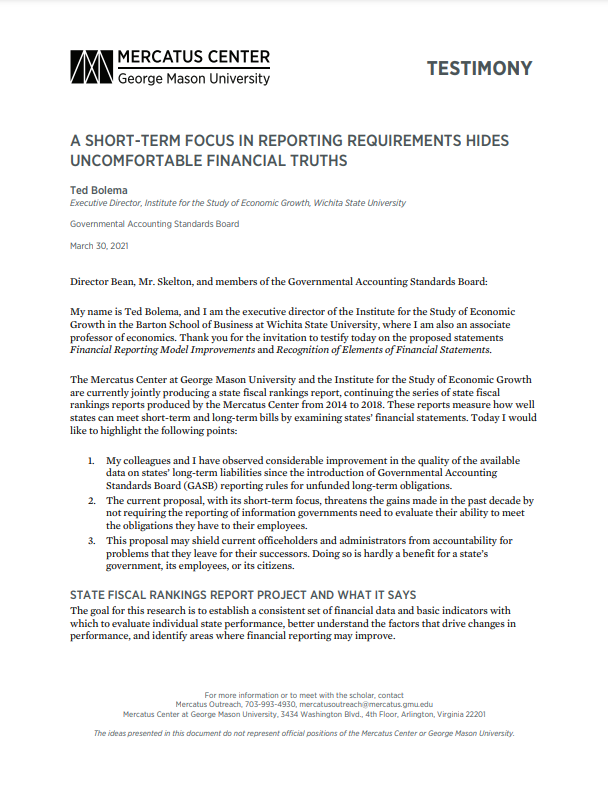Executive Summary
On March 30, 2021, Dr. Ted Bolema, Executive Director of the Institute for the Study of Economic Growth (ISEG), testified before the Government Accounting Standards Board (GASB) on the need for maintaining and improving current standards for government reporting and transparency.
Dr. Bolema highlighted his work on the State Fiscal Rankings report and noted considerable improvement in the quality of available data since the introduction of the GASB reporting rules for unfunded long-term obligations.
Dr. Bolema outlined how the current proposal under consideration threatened the gains made by no longer requiring reporting of information governments need to evaluate their ability to meet future obligations.
Further, Dr. Bolema highlighted while the proposal shielded current officeholders and administrators from accountability, their successors would be left with major problems which were of no benefit to the future government and its employees and citizens.
Director Bean, Mr. Skelton, and members of the Governmental Accounting Standards Board:
My name is Ted Bolema, and I am the executive director of the Institute for the Study of Economic Growth in the Barton School of Business at Wichita State University, where I am also an associate professor of economics. Thank you for the invitation to testify today on the proposed statements Financial Reporting Model Improvements and Recognition of Elements of Financial Statements.
The Mercatus Center at George Mason University and the Institute for the Study of Economic Growth are currently jointly producing a state fiscal rankings report, continuing the series of state fiscal rankings reports produced by the Mercatus Center from 2014 to 2018. These reports measure how well states can meet short-term and long-term bills by examining states’ financial statements. Today I would like to highlight the following points:
My colleagues and I have observed considerable improvement in the quality of the available data on states’ long-term liabilities since the introduction of Governmental Accounting Standards Board (GASB) reporting rules for unfunded long-term obligations.
The current proposal, with its short-term focus, threatens the gains made in the past decade by not requiring the reporting of information governments need to evaluate their ability to meet the obligations they have to their employees.
This proposal may shield current officeholders and administrators from accountability for problems that they leave for their successors. Doing so is hardly a benefit for a state’s government, its employees, or its citizens.
State Fiscal Rankings Report Project and What It Says
The goal for this research is to establish a consistent set of financial data and basic indicators with which to evaluate individual state performance, better understand the factors that drive changes in performance, and identify areas where financial reporting may improve.
From 2014 to 2018, the quality of the reporting of pension liabilities by states substantially improved. GASB should be commended for its guidance over the past decade that has required governments to make transparent the future obligations for benefits granted to their employees. For example, the state fiscal rankings reports find that states’ long-term liabilities increased significantly in fiscal year 2015, but that increase was largely the result of new GASB rules that required states to report unfunded pension obligations on their balance sheet. The size of long-term state liabilities did not increase as a result of the new rules; rather it was simply revealed, allowing policymakers to better understand their obligations to their employees and respond.
The state fiscal rankings reports also show that states with long-running structural deficits and large unfunded pension obligations tend also to have either skipped or reduced their contributions to employee pension and health benefit plans; these states have then issued debt to cover budget shortfalls or pension contributions, effectively adding to future obligations. The project no. 3-20 proposal would make it easier for states to continue these unhealthy fiscal practices by permitting states to hide what they are doing.
Studying how each state is performing with respect to a variety of fiscal indicators is not merely of interests to academics comparing the fiscal health of different states. Better standards for liabilities for pension benefits and for other post-employment benefits (OPEBs) such as healthcare and life insurance can help state policymakers address persistent issues and anticipate potential problems.
The Proposal and Its Consequences
The short-term focus of the proposal, including how it obscures the distinction between restricted and unrestricted funds, is problematic for multiple reasons. As stated in the executive summary of the proposal,
The recognition concepts for the short-term financial resources measurement focus and accrual basis of accounting would be based on whether items arise from short-term or long-term transactions and other events. Balances, outflows of resources, and inflows of resources from short-term transactions and other events would be recognized as the underlying transaction or other event occurs. Balances, outflows of resources, and inflows of resources from long-term transactions and other events would be recognized when payments are due [italics in the original].
Short-term accounting, as described in the proposal, is of questionable value to decision makers because it does not permit them to assess the full fiscal impact of the decisions they make. It appears to allow a pay-as-you-go approach for reporting long-term pension benefit and OPEB liabilities, and such an approach does not provide the information needed to evaluate the ability of governments to meet their obligations to their employees. Short-term accounting may have some limited utility in helping decision makers understand the short-term financial situation and ascertain the availability of adequate funds. A short-term focus may also help with the proposal’s stated goal of promoting consistency in financial statements across governments. Any such benefits, however, are outweighed by the loss of relevant information needed to evaluate the financial costs of policy decisions because the financial impacts will usually be spread over several time periods.
The proposal would allow state and local governments to close their eyes to growing unfunded liabilities for pension benefits and OPEBs. These unfunded liabilities remain an ongoing problem for many states, and the problem is likely to worsen in the era of COVID-19. The proposal may cause increases in unfunded liabilities to disappear from reported general fund balances. That doesn’t mean the problem disappears—just that the magnitude of the problem becomes hidden.
Put another way, the short-term focus allows current administrations to take actions in the near future without accounting for costs that will fall later. The costs of the decision show up only later, when they are due, often on the watch of another administration.
What Isn’t Measured Isn’t Managed
Old habits die hard, as project no. 3-20 demonstrates. The proposal largely reverses much of the progress toward producing meaningful and transparent financial statements made in a decade of movement toward requiring that pension and health benefit liabilities be properly reported on the governmental funds balance sheets. Just as state and local governments are finally accounting for their healthcare benefit liabilities, project no. 3-20 threatens that progress by allowing state and local governments to exclude pension benefit and healthcare benefit liabilities from their general fund balances. The focus on short-term financing also hides the full fiscal impact of policy decisions by shifting some of the costs to future years rather than the year in which the liability for the costs is created.
Project no. 3-20 does state and local governments no favors. It may shield current officeholders and administrators from accountability for problems that they leave for their successors, but doing so is hardly a benefit for the government, its employees, or its citizens. Eventually those problems will have to be addressed, and by the time they are addressed, they will have become much worse, with the costs falling on employees of the government and local citizens.
Decades of experience with the data reported by governments have taught a harsh lesson: whatever isn’t measured isn’t managed. Government accounting standards should help local governments make the right choices and provide the transparency needed to evaluate the impact of those choices. The proposal does the opposite.
Thank you for the opportunity to speak to you today. I look forward to your questions.




